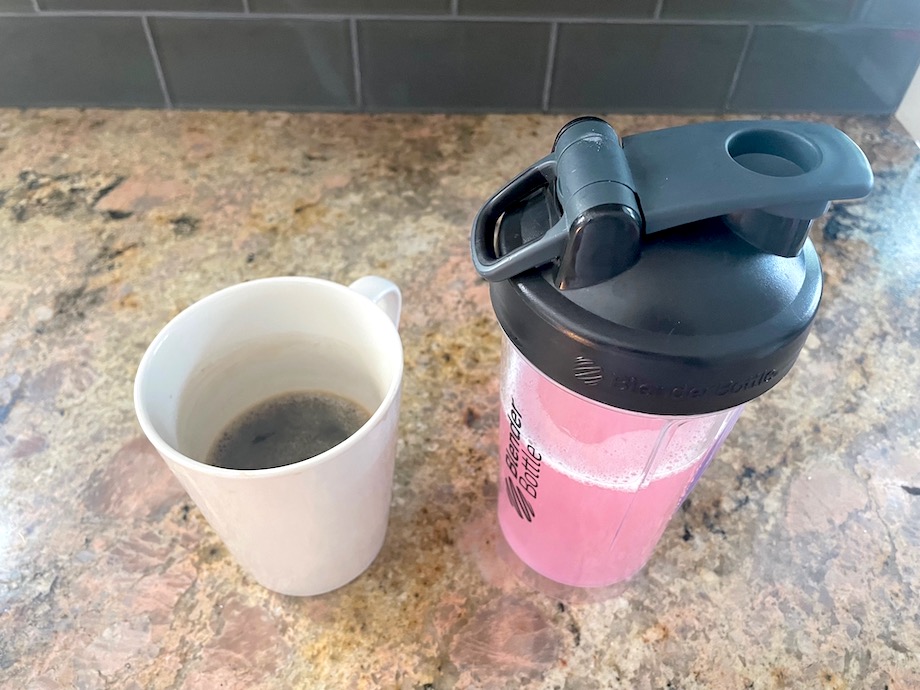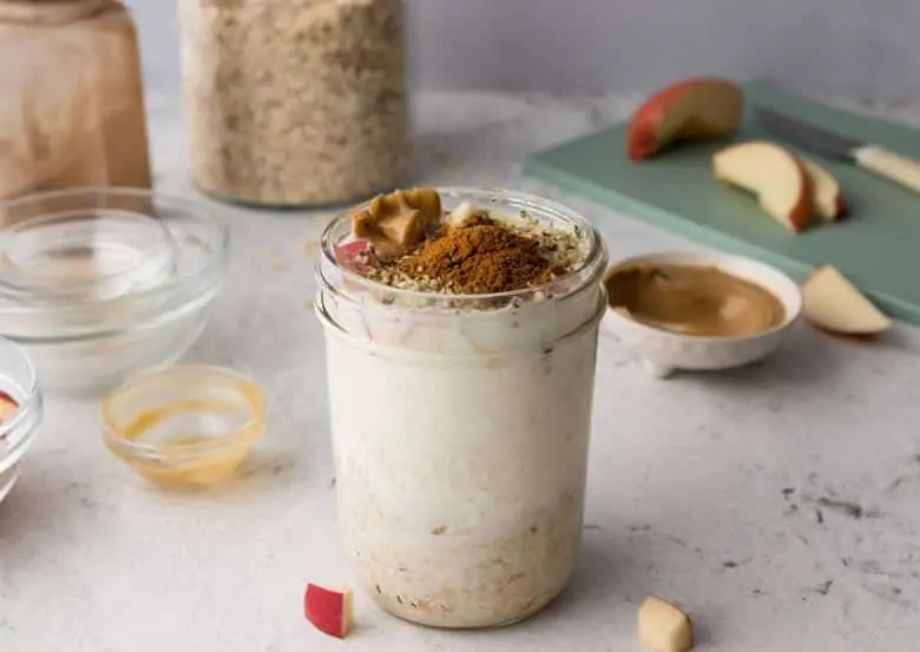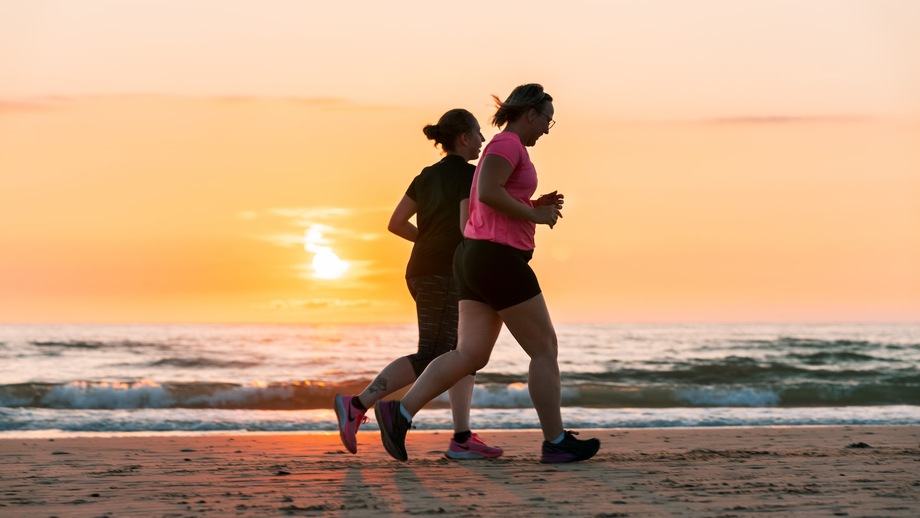We test and review fitness products based on an independent, multi-point methodology. If you use our links to purchase something, we may earn a commission. Read our disclosures.
The purpose of a pre-workout supplement is to give your body and mind an energy boost in preparation for a workout. Pre-workouts also improve exercise performance by enhancing strength and endurance.
Sure, pre-workout powder is easy to mix and can be downed quickly, but not all pre-workouts are created equal in terms of ingredient quality. Some contain sweeteners, artificial ingredients, and preservatives that you may wish to avoid. Luckily, pre-workout supplements are not your only option to fuel muscles and help perk you up before a workout. You can get the same result by eating a well-timed, balanced snack or small meal before working out.
Whether you’re looking for pre-workout alternatives due to budget or just prefer a more natural pre-workout, we’re sharing a list of the best (and easiest) natural pre-workout alternatives using food and drink you probably already have on hand.
Medical disclaimer: This article is intended for educational and informational purposes only. It is not intended as a substitute for medical advice. For health advice, contact a licensed healthcare provider.
Alternatives to Pre-Workout Supplements
The best pre-workout supplements typically contain stimulants, as well as carbs to provide a quick source of fuel to muscles and amino acids to support muscle recovery. They may also contain creatine to support muscle strength and B vitamins to support energy levels.
Foods and drinks that are natural sources of these nutrients can be used in place of a pre-workout supplement.
Caffeine
Most pre-workout supplements contain caffeine to provide a burst of energy. Caffeine acts on your central nervous system to help you feel alert and focused. Some supplements contain high amounts of caffeine per serving, way more than you’d find in a cup of coffee, which which can leave you with undesirable pre-workout side effects like jitters and heart palpitations.

Drinking a caffeinated beverage before your workout can give you the same energizing effect without going overboard. Use caution with caffeinated energy drinks, which can contain high amounts of caffeine plus other undesirable ingredients like added sugars and artificial ingredients.
Your best bets for a pre-workout caffeine fix are:
Coffee
Instead of a pre-workout, try sipping a cup of coffee about 30 minutes before working out. This can boost alertness, increase concentration, and support endurance1. If you work out early in the morning or later in the day when energy tends to lag, a simple cup of coffee can help.
RELATED: Coffee vs Pre-Workout
Green Tea or Black Tea
Cup for cup, tea contains less caffeine than coffee. Tea is a good choice if you don’t like the taste of coffee or prefer a lower caffeine option. Both green and black tea varieties are rich in antioxidants that are linked to additional health benefits.
Carbohydrates
Carbs deliver glucose, the body’s preferred energy source, to the bloodstream and muscles.
There are two types of carbs: simple and complex. Simple carbs refer to foods that contain smaller carbohydrate molecules, while complex carbs are made up of longer molecules.
Simple carbs include foods that lack fiber, like white bread, pretzels, and sweets. Complex carbs are foods that contain fiber, like fruits, vegetables, and whole grains. Foods with fiber take longer to digest, so you’ll want to eat complex carbs at least 1 hour before working out to give them a chance to break down and be used for energy.
Healthy pre-workout carb choices include:
Fruit
Fruit contains naturally occurring sugars that provide quick energy to your brain and body. They also contain water and minerals, like potassium and magnesium, that can support fluid and electrolyte balance during exercise and help prevent muscle cramps.
Try fresh or frozen bananas, pineapple, grapes, melon, berries, apples, pears, and citrus fruits or a handful of unsweetened dried fruit.
Oats
Oats contain B vitamins, which can support energy metabolism, and magnesium, which supports normal muscle function. Try a serving of cooked or soaked overnight oats before exercise. If you don’t like them plain, add fruit, nuts, or try them savory with a drizzle of olive oil and a pinch of salt.

A 2021 study3 found that individuals who eat oatmeal as a pre-workout snack before high-intensity interval training have lower levels of oxidative stress than those who do the same workout without eating oatmeal. This is significant, since intense exercise can increase oxidative stress in the body, which is a contributing factor to aging and health problems.
Sweet potatoes
Sweet potatoes are another good source of B vitamins and minerals, including potassium and magnesium, that support hydration, muscle function, and muscle recovery. Try munching on roasted sweet potato wedges or top a baked sweet potato with nut butter or yogurt for an easy pre-workout snack.
Combination Foods
In addition to glucose, your muscles also use fat for energy2 during longer training sessions with low to moderate intensity work, such as long-distance running, cycling, and swimming. Depending on the type and length of your workout, a snack that contains both carbs and fat may be your ideal fuel source.
Here are some pre-workout snack ideas that combine carbs and fat:
- An apple or banana with peanut butter
- Whole grain bread topped with mashed avocado or nut butter
- Fruit smoothie made with milk or yogurt
- Dried fruit and nut trail mix
- Plain full-fat or reduced-fat Greek yogurt with berries
Benefits of a Pre-Workout Snack
- Energy and Fuel
The main reason to eat a pre-workout snack is to perk up mental and physical energy levels and provide fuel to your muscles to use during exercise. While caffeine can help you feel mentally alert and ready to train, a bump in blood glucose levels before working out delivers energy to muscles and can help delay muscle fatigue mid-workout.

- Supports Recovery
Protein isn’t used as an energy source during exercise, but you may still want to include a bit in your pre-workout snack. Protein eaten before exercise4 has been found to benefit post-workout recovery and muscle growth. However, there’s no need to start taking protein powder before working out, since the evidence still supports total daily protein and post-workout protein consumption as most effective for building lean mass.
RELATED: Best Protein Powder
- Manages Hunger
When you feel hungry, it can be tough to focus or feel energetic. If it’s been awhile since your last meal, a pre-workout snack can take the edge off of hunger pangs that could distract you from training.
- Supports Daily Nutrition Goals
Choosing healthy, whole foods for your pre-workout snacks contributes macronutrients, vitamins, minerals, fiber, and antioxidants to your daily intake. If you’re aiming to eat a certain amount of carbs or protein throughout the day, a pre-workout snack can help you meet your goals.
What to Avoid Eating Before a Workout
Eating a pre-workout snack or small meal can improve workout performance, but that doesn’t mean anything goes. There are certain foods you should skip pre-workout and save for other times of the day.
First of all, pass on any foods that don’t normally agree with you. If you’re sensitive to certain ingredients or food combinations, don’t include them in your pre-workout snack. The last thing you want is to have to cut your workout short or be too uncomfortable to give it your all because your stomach is bothering you.
Avoid foods that you know can trigger bloating, gas, and heartburn. Greasy items, like fried food and fast food, and spicy food can cause digestive upset, but this varies from person to person, so use your best judgment.

Your pre-workout snack should be exactly what it sounds like—a snack. Eating or drinking large quantities or having a heavy meal before working out can have the opposite intended effect and leave you feeling sluggish and sleepy. Plan to have your pre-workout snack at least 30 minutes or up to 2 hours before exercise.
Although carbs are a preferred quick energy source, it’s not a great idea to reach for candy, sugary drinks, or other sweeteners before working out. Foods with refined sugar don’t offer much in the way of nutrition and they aren’t a good choice for weight loss. Sweets also cause blood sugar to rapidly rise and fall, since there’s no fiber, fat, or protein to slow down digestion, which means a sugar fix won’t provide you long-lasting energy.
Pre-Workout Alternatives: Final Thoughts
Pre-workout supplements aren’t a prerequisite for a solid workout performance. You can just as easily energize and fuel your body before exercise with a nutritious pre-workout meal or snack that includes foods already part of your diet. Using food for pre-workout energy also gives you way more variety in flavor, texture, and nutrition than supplements.
RELATED: Best Pre-Workout Ingredients
The type and duration of your workout determines your optimal pre-workout fuel source. Carbs should be your go-to pre-workout energy source on days you do high-intensity training, like powerlifting and tabata. For longer workouts that are lower in intensity, like long-distance running, eating both carbs and some healthy fat beforehand will provide sustained energy.
- Pre-workout supplements are formulated to mentally and physically energize you in preparation for a workout. They’re also used to boost athletic performance and endurance.
- Although easy to use, pre-workout supplements are an added workout expense and many contain high amounts of caffeine or other stimulants that don’t agree with everyone.
- A pre-workout snack is a natural way to boost energy and fuel muscles.
- A cup of coffee or tea is a natural source of caffeine that can help enhance focus and make you feel pumped up before a workout.
- Carbs, like fruit and oats, are complex carbs that provide you with natural sugars for energy plus, fiber, vitamins, and minerals.
- Including a bit of healthy fat, such as nuts or avocado, before exercise helps fuel longer sessions of low- to moderate-intensity training.
- Pre-workout snacks should include nutritious ingredients, like fruit, veggies, nuts, and whole grains.
Pre-Workout Alternatives: Q&A
What can I use to replace pre-workout?
The purpose of a pre-workout supplement is to provide you with a quick source of energy, usually consumed 30 minutes to 1 hour before exercise, to fuel your workout. If you’re looking for a more natural pre-workout or trying to save money on supplements, you can create a pre-workout snack using everyday food and drinks.
How can I get energy without pre-workout?
Unless you’re following a keto diet, carbohydrates are the body’s primary energy source. Foods that contain carbs will deliver glucose to your bloodstream, which can be used by muscles to perform work. Carbs are ideal for high-intensity workouts, since muscles almost exclusively burn glucose under these conditions. They switch to burning fat during longer, less intense workouts, so eating a healthy fat before working out can provide lasting energy.
What can I drink as a pre-workout?
You can drink a caffeinated beverage, like a cup of coffee or tea, for a natural source of wake-you-up caffeine. You can also blend brewed coffee or tea with ice, milk, and fruit, such as a frozen banana, for a caffeinated frozen smoothie. If you don’t drink caffeine, try a fruit smoothie made with milk or yogurt. Your muscles will receive quick energy from the natural sugars in fruit and dairy.
What’s a natural pre-workout food?
Foods that contain carbs and/or fats make good pre-workout food options. For carbs, try fresh or dried fruit, whole grain crackers or bread, sweet potatoes, or oatmeal. For healthy fat, try nuts or avocado. For both carbs and fat, try a fruit smoothie with avocado or smear nut butter on a piece of toast.
These statements have not been evaluated by the Food and Drug Administration. This product is not intended to diagnose, treat, cure, or prevent any diseases.
References
1. Guest NS, VanDusseldorp TA, Nelson MT, et al. International society of sports nutrition position stand: caffeine and exercise performance. J Int Soc Sports Nutr. 2021;18(1):1. Published 2021 Jan 2. doi:10.1186/s12970-020-00383-4
2. Muscella A, Stefàno E, Lunetti P, Capobianco L, Marsigliante S. The Regulation of Fat Metabolism During Aerobic Exercise. Biomolecules. 2020;10(12):1699. Published 2020 Dec 21. doi:10.3390/biom10121699
3. Zeng Z, Jendricke P, Centner C, Storck H, Gollhofer A, König D. Acute Effects of Oatmeal on Exercise-Induced Reactive Oxygen Species Production Following High-Intensity Interval Training in Women: A Randomized Controlled Trial. Antioxidants (Basel). 2020;10(1):3. Published 2020 Dec 22. doi:10.3390/antiox10010003
4. Cintineo HP, Arent MA, Antonio J, Arent SM. Effects of Protein Supplementation on Performance and Recovery in Resistance and Endurance Training. Front Nutr. 2018;5:83. Published 2018 Sep 11. doi:10.3389/fnut.2018.00083
Further reading

A sports nutrition coach explains the best time to drink a protein shake for weight loss. Read more

Are you looking for something that’ll make your hammies cry all the way home, but in a good way? Check out our list of the best hamstring exercises! Read more

Read our Magic Kitchen review for our thoughts on pricing, ingredients, and quality of the gluten-free food before trying this meal delivery service. Read more

Is this all-natural, quality whey the right choice for you? Find out with our Sports Research Whey Protein review. Read more

